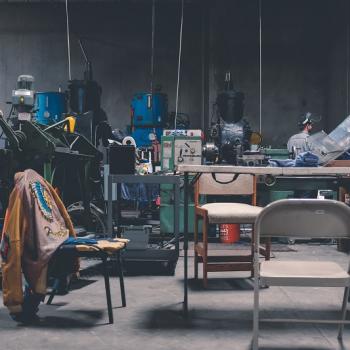 By Tim Soots, originally published at the KPN Resources blog
By Tim Soots, originally published at the KPN Resources blog
Being a Reformed Christian, I am committed to the centrality of the mediatory work of Christ on our behalf. Christ stands as the perfect human who liberates humanity from sin and death and restores us to a right relationship within the Trinity. To the best of my understanding, this framework is the pivot point of the best theologies the church has to offer. However, I have been rather startled to notice how little the faith, work, and economics dialogue centers on the mediatory work of Christ on our behalf.
In a recent sermon I tried my best to establish a working motif that would allow for a Christ-centered understanding of work that liberates Christians from the Pelagian temptation to work harder for the glory of God in their workplace. Here is my basic argument:
Is/Ought Difficulty
After the Fall, we humans have always been tempted to prove ourselves before God. Even Protestants fall into the legalism that says, “If I just have my quiet time and stop sinning in areas of consensual disapproval then God will like me.” This is what I call moving from an ought to an is. Meaning, we try to move from a place of obedience to earn our identity as sons or daughters. As we all know, this never seems to work. Rather, we are called to move from the is of being reconciled to God the Father through adoption in Jesus, to the ought of living into our adoption as sons and daughters. How I talk about this with our church is: “You have been united to Christ, so you have already been accepted before God as a son and daughter, now live like one.” This, in my estimation, is the only way to escape the temptation of legalism – to recognize that we are incapable of doing good on our own, and yet through Christ we have been made good in HIS goodness and have been freed to live into the identity that he has freely given us.
Purpose of Work
From this starting point, I was able to move into the topic of work. In short, I argued that the purpose of work is twofold. First, because all of creation is a gift from God, we ought to engage creation with thankfulness. The best way to say thank you to a wonderful gift is to steward the gift given (e.g. a teenager who takes care of his/her first car shows a posture of thanksgiving to his/her parents). So too, Christians are called to steward the gift of creation as an act of thanksgiving and therefore worship before God. I used Colossians 3:23 as my text: “Whatever you do, work at it with all your heart, as working for the Lord, not for human masters.”
The second purpose of work is for the blessing of others. Because we are created in the Image of God and God is a gift giver, we are created to be gift givers. This is why Proverbs 11: 10 says, “When the righteous prosper, the city rejoices.” When humans live into the Imago Dei they live into their calling to be gift givers. The reason why the city rejoices when the righteous prosper is because as the righteous prosper, they live into their calling as servants/gift givers to others – and who doesn’t rejoice over a gift!
Jesus as Carpenter
It now comes to the point where we need to admit that the model given to us is impossible on our own. We cannot be worshipers and servants on our own. Through the Fall we turned inwards and forgot to look up and side to side. However, the good news of the Gospel is that when we turned away from God and one another, Christ came down to be the perfect human. He worshiped God fully in all that he did and lived and died for the sake of his brothers and sisters.
So here is the catch. Jesus was a carpenter for six times longer than he was a missionary. Therefore, if ALL of Christ’s life was representative for us, then that includes his 18 or so years as a carpenter. Meaning, as a man, Christ lived his life fully for God and fully for the sake of others. Therefore, Christ the carpenter stewarded creation perfectly for the glory of God and worked completely for the blessing of others.
Because Christ was a carpenter and lived on our behalf, we have already been made into perfect workers before God. Our calling is to live into who Christ has ALREADY made us to be. We already are worshipers in our work and servants in our work, now let’s live into this calling!
Reflection Questions:
- In our preaching, do we often jump to the ought before establishing the is of being united to Christ? How does that lead to legalism or burnout in our own lives and the lives of our people?
- How can a theology of work, grounded in Christ as the perfect worker, combat boredom or frustration in work?
- What does Christ’s carpentry have to say about excellence in one’s work?
Tim Soots is a graduate of Denver Seminary and the curate at Wellspring Church in Englewood, Colo.
Image: KPN.












